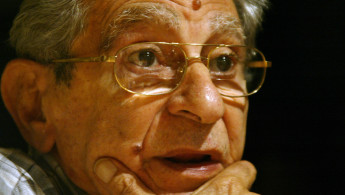Revisiting and reviving Youssef Chahine's filmmaking legacy
The Liverpool Arab Arts Festival (LAAF) is where Arabs from across the world come together to showcase upcoming Arab talent and to show off how rich Arab culture is.
People from all faiths, genders and races gather to learn about the sheer abundance that lies within Arab culture.
They're exposed to forms of arts that they hardly knew even existed in the region, breaking stereotypes enforced upon Arabs by both non-Arabs and Arabs themselves.
And it isn't just new talent they showcased. A filmmaker whose work took off in the 1950s was centre stage at the festival this year.
The LAAF chose three films made by Youssef Chahine to screen at the festival. The films, which were remastered in 2018 to mark the tenth anniversary of Chahine's death, are a semi-autobiographical series.
"Misr Film International remastered 20 of Chahine's best work and we thought instead of just having one film, let's make a whole film programme of UK premiers of the work," LAAF's Head of Programming, Anahid Kassabian, told The New Arab.
"His work is so important and it makes more sense to see them collectively", she added – emphasising on the fact that Chahine's work must stay relevant through the generations.
His work is regarded because of its quality but because of the way he navigated social issues in the age of censorship.
"One thing he struggled with repeatedly, not constantly, but repeatedly with is censorship," Anahid said.
"For instance, the first film we showed has a relationship between a young Jewish man and a Muslim activist with a fairly clear but not overly implied gay relationship."
Released in 1979, Alexandria.. Why is set during the Second World War and has been described as a melting pot of plots that include a homosexual relationship between the protagonist's cousin and a British soldier, a love affair between an Arab nationalist and a Jewish girl who is forced to leave to Palestine.
"One of Chahine's aims was to really show the diversity of Alexandria," Anahid explained.
Generations later
Despite the fact that Chahine's last film was last released a year before his death in 2007, there are many who have not heard of his work or understand his impact on Arab film.
"It's a generational issue, it's really true that younger people don't know him as well as I might think they should – it's not a criticism it's just an observation," Anahid said.
This is in spite of the fact that actor Omar Sherif, who is regarded a household name in the Arab world is well known by youngers, but not Chahine, who brought his talent to light in the film world.
"This is because many of the films they worked on together were early; they weren't either of their best work," Anahid explained adding that they worked together later on in life.
"The difference between the two is we know Sherif as a mainstream actor and Chahine is not a mainstream filmmaker," Anahid said.
Still, Anahid urged everyone to familiarise themselves with Chahine.
"Anyone can benefit from his films – from historical lessons to epics and people you might not know about along with political realities in Egypt, Chahine's home."
Reviving film?
As technology advances, ways in which people consume their entertainment evolve. With people increasingly watching shorter clips on their phones, or watching movies from the privacy of their bedrooms with their laptops, many have predicted the end of watching a film on a big screen.
"It's dangerous to predict what will happen to film because of the way in which people have consistently predicted its demise," Anahid explained.
"What I will say, though, is that there is something special about collective viewing," she added.
Because of this, and the luxury of viewing a piece of art on a big screen with friends, family and strangers, Anahid believes the "shared experience" of cinema will keep film in the Arab world alive and possibly even call for the film industry's revival in a creative boom.


